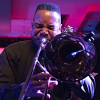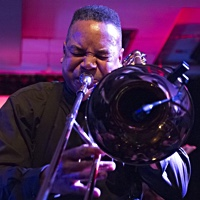Home » Jazz Musicians » Joseph Bowie
Joseph Bowie
Joseph Bowie, the youngest member of the Bowie musician family, began is career in St. Louis, Missouri where he was born in 1953 and raised by his father William Lester Bowie, Sr. & mother Earxie L. Bowie. Joseph’s father was a music teacher and he was greatly influenced by his older brothers Byron (saxophonist & arranger) and older brother Lester, internationally acclaimed jazz trumpeter.
Joe made his first international tour with B.A.G, in 1971 with Oliver Lake, Baikida Carroll, Bobo Shaw, Floyd Leflore & Julius Hemphill moved to Paris to begin his his first major tour with a jazz ensemble. During this time in Paris, Joe worked with other jazz notables; Alan Silva, Frank Wright, Bobby Few and others. Joe & Charles Bobo Shaw also further developed the Human Arts Ensemble and collaborated with great French musicians Domonique Gaumont and Philippe Gaillot. Both were exceptional guitarists. Dominique went on to perform with the Miles Davis Band and Philippe extended his professional career on guitar and keyboards with Stephane Belmondo and Mike Stern. Joe & Baikida Carroll also joined Dr. John in Montreaux in 1973 performing with Alan Tousaint and Professor Longhair.
In 1973, Joseph with drummer Charles Bobo Shaw moved to New York City and with the help of Ellen Stuart of La Mama Experimental Theater Group extablished the La Mama children’s theater on the lower east side of NYC. During this period 1973 –76 Joe collaborated and performed with Cecil Taylor, Human Arts Ensemble,Leroy Jenkins, Stanley Cowell, Sam Rivers, Ornette Coleman & many more jazz personalities in New York at that time. Joseph became a notable member of the new jazz community in NY. The La Mama Children's Theater soon became noted for historic jam sessions frequented by noted jazz artists such as Art Blakey, Woody Shaw, Wilbur Ware, Philip Wilson, Lester Bowie, the Art Ensemble of Chicago and and log list of Jazz notables in New York at that time. Dominique Gaumont and Philippe Gaillot migrated from Paris to NY at that time and joining long time friends Bobo Shaw and Joe to support the world class Jam Sessions at the Children's Theater. Some incredible music was performed during this period. Unfortunately there was little audio/visual documentation done. In 1976 Joe moved to Chicago where he became a Rhythm & Blues specialist leading bands for Tyrone Davis and other R& B artists. Returning to NYC in 1978 Joseph began working with Punk/funk artist James Chance and soon became a fixture on the new wave scene in NY. Defunkt was born during that time. During the next 25 years, Defunkt has recorded 15 CD’s and Joseph has become a funk aficionado throughout the world collaborating with funk entities such as Dave Doran, Sigi finkel, Wolf Wolf, Jean-Paul Bourelly.
Read moreTags
Meet Joseph Bowie and Oliver Lake

by Cheryl K.
In this hour, an interview with trombonist Joseph Bowie and saxophonist, composer, painter, and poet Oliver Lake, two members of the interdisciplinary arts ensemble BAG--Black Artist Group. The reissue label, WeWantSounds, is set to release its long-lost concert recording “For Peace and Liberty--In Paris, Dec. 1972." BAG was founded in St. Louis, MO in 1968 and included the core members of Bowie, Lake, trumpeters Baikida Carroll and Floyd LeFlore, and drummer Charles “Bobo" Shaw . Playlist Black Artist ...
Continue ReadingJoseph Bowie Interview "Defunkt Soul"

Source:
All About Jazz
Joseph Bowie interview “Defunkt Soul 2" This interview is part of the book project under your skin which includes Interviews with: David Murray, Ornette Coleman, Chuck D - Public Enemy, Taj Mahal, Yusef Lateef, Melvin Gibbs, Bob James, Malika Zarra, Zap Mama, Les Nubians, Lydia Lunch, Lee “Scratch Perry", Erika Stucky, Henry Rollins, Rhonda Smith, DJ ...
read more
Ethnic Heritage Ensemble’s 25th Anniversary Tour: Kahil El'Zabar --- Ernest "Khabeer" Dawkins --- Joseph Bowie

Source:
All About Jazz
"Tradition Meets Contemporary Innovation"
The EHE has been about two horns and a drum for 25 years. Kahil has been active in usurping the artificially ingrained construct which dictates that the tuba or bass represent the basic harmonic structure, the horn, piano or guitar represent melody with harmony and the drummer remains the timekeeper. This has been an AACM mandate ever since the organization's inception: getting all participants to develop their own conceptual approach to music.
“Serenely centered one moment, ...
read more

















_with_Skip_Mcdonald_(Right)_23_n.jpg)







